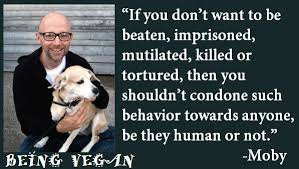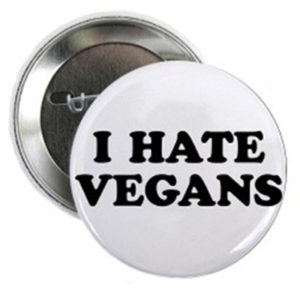
A December 2018 US study 1 , entitled “If I became a vegan, my family and friends would hate me:” Anticipating vegan stigma as a barrier to plant-based diets, looked at why vegans appear to be universally distrusted, disliked and even hated both by a significant percentage of omnivores and, surprisingly enough, even by a significant percentage of vegetarians.
In light of the fact that meat consumption is rising globally2 , and meat consumption has been demonstrated to be more harmful than a plant-based diet for human health 3 , the environment 4 and, of course, for the animals themselves 5 , the study went on to look at what chances there are that plant-based diets will become the norm in Western societies and what steps need to be made to make this major dietary/lifestyle transition possible.
Study Method
A number of focus groups were put together consisting of omnivores, vegetarians and vegans. They were asked questions about each other and about those who ate a similar diet to themselves.
Study Assumptions
Meat continues to be a significant part of the Western diet, and there have been many studies on why omnivores rationalise their meat consumption, including:
- difficulty breaking dietary habits 6 7
- enjoyment of the taste of meat8
- identification with masculine characteristics9
- denial that animal have ‘minds’ or ‘rights’10 11
- food is a deeply social activity 12
- people bond by sharing common dietary meanings and experiences 13 14
The study also starts with the finding 15 16 17 that people generally view vegetarians and vegans negatively because they severely disrupt social conventions related to food. It’s due to this dietary deviance 18 that the authors of this study argue that vegans are prone to stigma 19 .
They further argue that vegan stigma may be the reason why people are deterred from reducing their meat and animal product consumption. Basically, individuals anticipate the stigma that would follow from such ‘deviant’ behaviour, and thus, they desire to avoid being labelled and treated like those in the stigmatised group 20 21 . This characterisation of vegans by omnivores and vegetarians appears 22 23 24 to be a major reason why many non-vegans eschew plant-based diets.
Vegans were the only group that uniformly responded with positive descriptors when explaining how they view vegans and veganism. Key words and phrases here included “aware,” “open-minded,” “peaceful,” “kind,” and “loving.”
When vegans listed negative descriptors, it was exclusively in the context of how vegans thought non-vegans viewed them and their ideas. For instance, the vegans all agreed that non-vegans viewed their actions as “crazy” and “stupid.”
The following verbatim statements taken directly from the study by omnivores, vegetarians and vegans would seem to support the latter hypothesis.
How Omnivores, Vegetarians & Vegans View each Other
Vegan 1: You don’t even know the amount of times that people have said to me, ‘You’re crazy’ or ‘I could never do it.’
Vegan 2: Everywhere you go, everyone is trying to prove you wrong.
Vegan 3: It’s also challenging with people. Like she [Vegan 2] said, it’s really hard with people who are looking down on you [for] doing the ‘wrong thing’—not doing what is normal.
Vegan 1: Passionate is definitely something that would describe most vegans and often gets us in trouble because people feel like we’re yelling at them to change them because we care so much about this cause and want other people to understand … They don’t understand.
Vegan 4: They’re scared of it, [veganism] …
Facilitator: When you say they’re scared—why’s that?
Vegan 4: That you’re going to take away what they have. Like I’m going to take away your ability to eat meat … They’re scared that I’m going to impose my beliefs on them.
Vegetarian 1: Someone will say, ‘I can’t eat that—I’m vegan.’ And it’s like, ‘Oh, you’re vegan.’ Like, you have to say it—you can’t just say you can’t eat it.
Vegetarian 2: There’s usually a pause after somebody says I’m a vegan. [Group laughter] Maybe it’s a little angst part of me that’s like, ‘What is the reaction they’re seeking?’ or something. Like it’s kind of a moral war … I feel like some people that I have encountered, people who are vegan, have kind of, just like, this air about them.
Vegetarian 4: With the pretentious and condescending thing, I find that some vegans look down on other people … You’re not going to change anyone’s opinion by telling them that they’re wrong. They’re going to be like, ‘Yeah, I’m wrong, but it’s delicious.’
Omnivore 1: I’d agree with opinionated too because I know some vegans, and everyone that I know, they really like to talk about how they’re vegan, and they like to tell you, ‘Oh it’s so good ‘cause of this and that, and this and that.’
Omnivore 2: It sort of goes along with all those militant, self-righteous, overzealous, kind of—go down that continuation—that in order to continue their lifestyle, they kind of have to force people out of the way … They have to be kind of aggressive to keep it going.
Omnivore 3: Every time I’ve ever met a vegan, they’ve like tried to convince me to become a vegan. They talk about how great it is, and if you meet somebody that is a vegan, the first thing they tell you, they’re like, ‘Oh yeah, I’m a vegan.’ It’s the first thing they say about themselves.
Omnivore 4: They’re really vocal with their veganism and try to kind of like, force it down people’s throats sometimes.
Omnivore 5: The same as what she [Omnivore 3] said: They’re very like, ‘Everybody should be vegan. Vegan, vegan, vegan.’
Omnivore 2: Being a hunter—last year, a deer I’d shot was in the back of my truck. I was like, ‘Yeah, I still got to get gas’ … a vegan came up to me and tried to talk some sense into me and was like, ‘Stop hunting, stop hunting.’ Whatever … I told him that’s one less deer that you’re not [sic] going to hit with your car with your family in it. That’s exactly what I told him. He’s still dead on, ‘Stop hunting. This is God’s gift to us. We shouldn’t harm them.’ Go to Hell.
Omnivore 2: There’s this girl in high school—I’m not friends [with her] by any means, [or] probably actually to any vegans at all—but I met this one girl in high school and she was a vegan … Everything she wanted to write about was veganism. She would always throw it in your face and ruin your lunchtime because she was vegan. For that, it really annoyed me the way she would talk about it. For that, I avoid vegans, and when I hear about stuff being vegan, I am not happy about it.
Facilitator: What is it that people are assuming about vegans as people that would lead it to be stigmatised?
Vegetarian 6: I think it’s that people just assume that vegans look down on others. So, you don’t have to be in someone’s face about it, but just knowing they’re vegan, I think people think, ‘If I eat a cheeseburger in front of them, they are definitely judging me.’
Vegetarian 11: I’m a really picky eater already, so like, holidays are already difficult for my family, so I feel like if I were to, you know [become vegan], my family would hate me. [Group laughter]
Omnivore 8: I know for a fact that my dad would totally not be okay if I wanted to be a vegan. He would think it was the craziest thing ever and not understand and try to make me eat the things that I didn’t want to. So, I know that would be so hard if I had to go home and be like, ‘Oh I’m a vegan now.’ They’d be like, ‘No. You’re not.’
Omnivore 9: They wouldn’t take you seriously, and they’d make it for you anyway. And you’re like, ‘But I said I was a vegan.’ They’d still be like, ‘No.’
Vegan 4: We are met with a lot of … ‘What? Why? Come on, eat this steak!’ I’ve been bribed by my dad’s friends to eat a steak with them for two hundred dollars. They’re like, ‘Let’s do it!’ I’ve been doing this since I was eleven. I’m pretty good [without the steak]. Please don’t [bribe me].
Vegan 3: My whole family eats their steak bleeding. We’re super Italian. There’s cheese in everything … [But] when you go home, you want to be with your family … because you see them maybe once a month because you’re at school. They make this amazing meal for you … but it’s covered in cheese. It still counts [as nonvegan].
Study authors: Here, the vegan desires emotional and social closeness with her family. However, the refusal to create space for her eating preferences reinforces social distance by asserting through food that the family does not eat in ways amenable to vegans. These are precisely the kinds of experiences that non-vegans anticipate they would face if they were to eat like a vegan.
Study authors: What would facilitate a transition toward a vegan diet or lifestyle?
Omnivore 9: Having supportive family members and friends.
Omnivore 10: I think [people] being more open-minded to it. I feel like we’re so closed-minded on what should be instead of making it more available.
Vegetarian 6: Definitely to have, like, the support from your family so that those gatherings and holidays are easier. And friends, as well.
Study conclusions
In the Global North, even though veganism and some moves towards meat reduction have begun to appear, meat- and animal product-free diets are still firmly embedded in our cultures and belief systems. Because of this, the study appears to conclude that it’s unlikely that plant-based diets will be the norm any time soon.
One suggestion for possible future research into ways in which plant-based diets can become more acceptable is by looking at those cultures where vegetarianism is already strongly established – usually in relation to religions, such as those with origins in ancient India 25 .
Thus the authors consider it vital for future research to attempt to answer the following questions:
- what experiences vegetarians and vegans have across the globe?
- are they viewed and treated in the same stigmatised manner as in the United States [and elsewhere]?
- what other factors enabled meat- and animal product-free lifestyles to flourish in these places in a way that is socially acceptable and evasive of the stigma present in the United States [and elsewhere]?
The answers to such questions may perhaps provide some clues toward eliminating the social barriers to veganism that affect the majority of Americans and perhaps other nations worldwide.
Final comments
It’s clear from the foregoing that there is a long way to go before veganism stands a chance of being the norm in Western countries. Perhaps it’s fair to say that WFPB is to veganism what veganism is to vegetarianism – one more level away from the norm. It’s no accident that many vegans try to emulate meat-eaters by choosing processed food products that emulate meat, such as vegan sausages, burgers, bacon and cheese. The latter is not an option in a WFPB diet, particularly when it’s non-SOS WFPB.
Does this mean that WFPBers (if there’s such a word) are going to be even more under attack than vegans? It would, of course, depend on how each individual presents themselves and whether or not they are seen to be ‘preaching’ or ‘judging’. For my part, I acknowledge that life in our society is much harder because of eating a WFPB diet, certainly in terms of eating out and shopping in general. There is some social isolation involved and I would imagine that for many omnivores (and even some veggies and vegans), being with someone who adheres strictly to a WFPB diet must be something of a culture shock.
However, my major concern is human health – my health and the health of those I know and love. If eating the optimal diet for maintaining that health causes some barriers and difficulties in my life, then so be it.
The facts accumulating through reputable research continue to support a non-SOS WFPB diet as the healthiest option for humans. But each person has to make up his or her own mind about the importance of long-term optimal health to themselves and those under their care. The key, for me at least, is to avoid preaching and to allow other people to do what they want. After all, in our Western countries, it’s still legal to smoke ciggies, drink alcohol and, at least in the UK, even to commit suicide, so each to their own poison.
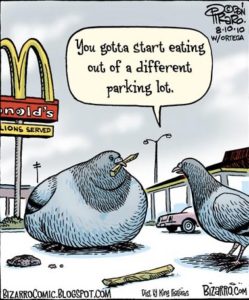
References
- “If I became a vegan, my family and friends would hate me:” Anticipating vegan stigma as a barrier to plant-based diets. Markowski KL, Roxburgh S. Appetite. 2018 Dec 31. pii: S0195-6663(18)31387-4. doi: 10.1016/j.appet.2018.12.040. [↩]
- Henchion, M., McCarthy, M., Resconi, V. C., & Troy, D. (2014). Meat consumption: Trends and quality matters. Meat Science, 98, 561–568. [↩]
- Perm J. 2013 Spring; 17(2): 61–66.
doi: 10.7812/TPP/12-085. Nutritional Update for Physicians: Plant-Based Diets. Philip J Tuso, MD, Mohamed H Ismail, Benjamin P Ha, MD, Carole Bartolotto, MA, RD [↩] - Cowspiracy: The Facts [↩]
- Earthlings [↩]
- Lea, E., Crawford, D., & Worsley, A. (2006). Public views of the benefits and barriers to the consumption of a plant-based diet. European Journal of Clinical Nutrition, 60, 828–837. [↩]
- Phjolainen, P., Vinnari, M., & Jokinen, P. (2015). Consumers’ perceived barriers to following a plant-based diet. British Food Journal, 117, 1150–1167. [↩]
- Graca, J., Calheiros, M. M., & Oliveira, A. (2015). Attached to meat? (Un)Willingness and intentions to adopt a more plant-based diet. Appetite, 95, 113–125. [↩]
- Rothgerber, H. (2013). Real men don’t eat (vegetable) quiche: Masculinity and the justification of meat consumption. Psychology of Men and Masculinity, 14, 363–375. [↩]
- Bastian, B., Loughnan, S., Haslam, N., & Radke, H. R. M. (2012). Don’t mind meat? The denial of mind to animals used for human consumption. Personality and Social Psychology Bulletin, 38, 247–256. [↩]
- Rothgerber, H. (2014a). Efforts to overcome vegetarian-induced dissonance among meat eaters. Appetite, 79, 32–41. [↩]
- Delormier, T., Frohlich, K. L., & Potvin, L. (2009). Food and eating as social practice—
understanding eating patterns as social phenomena and implications for public health. Sociology of Health & Illness, 31, 215–228. [↩] - Beardsworth, A., & Keil, T. (1997). Sociology on the menu: An invitation to the study of food and society. New York, NY: Routledge [↩]
- Ochs, E., & Shohet, M. (2006). The cultural structuring of mealtime socialization. New Directions for Child and Adolescent Development, 111, 35–49. [↩]
- Cole, M., & Morgan, K. (2011). Vegaphobia: Derogatory discourses of veganism and the reproduction of speciesism in UK national newspapers. British Journal of Sociology, 62, 134–153. [↩]
- Potts, A., & Parry, J. (2010). Vegan Sexuality: Challenging heteronormative masculinity through meat-free sex. Feminism & Psychology, 20, 53–72. [↩]
- Wright, L. (2015). The vegan studies project: Food, animals, and gender in the age of terror. Athens, GA: The University of Georgia Press. [↩]
- Boyle, J. E. (2011). Becoming vegetarian: The eating patterns and accounts of newly practicing vegetarians. Food and Foodways: Explorations in the History and Culture of Human Nourishment, 19, 314–333 [↩]
- Bresnahan, M., Zhuang, J., & Zhu, X. (2016). Why is the vegan line in the dining hall always the shortest? Understanding vegan stigma. Stigma and Health, 1, 3–15. [↩]
- Johnston, L. (2002). Behavioral mimicry and stigmatization. Social Cognition, 20, 18–35. [↩]
- Quinn, D. M., & Chaudoir, S. R. (2009). Living with a concealable stigmatized identity: The impact of anticipated stigma, centrality, salience, and cultural stigma on psychological distress and health. Journal of Personality and Social Psychology, 97, 634–651. [↩]
- Lea, E., & Worsley, A. (2001). Influences on meat consumption in Australia. Appetite, 36, 127–136. [↩]
- Lea, E., & Worsley, A. (2003). Benefits and barriers to the consumption of a vegetarian diet in Australia. Public Health Nutrition, 6(5), 505–511. [↩]
- Rosenfeld, D. L., & Burrow, A. L. (2017). The unified model of vegetarian identity: A conceptual framework for understanding plant-based food choices. Appetite, 112, 78–95. [↩]
- Stuart, Tristram (2006). The bloodless revolution: A cultural history of vegetarianism from 1600 to modern times. New York: W. W. Norton [↩]
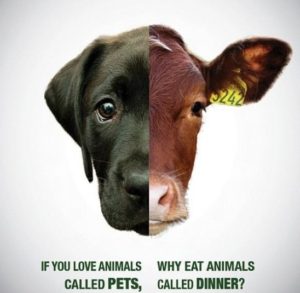
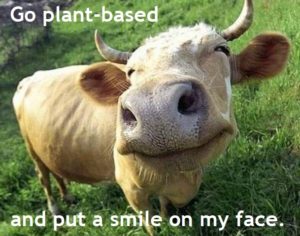
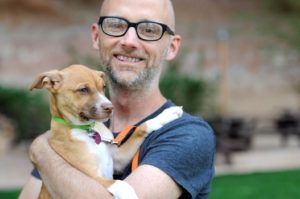
 So this is me with Pakka the cat. When Pakka was hit by a car I had to stay home from school for a day and just mourn and cry because Pakka was my best friend.
So this is me with Pakka the cat. When Pakka was hit by a car I had to stay home from school for a day and just mourn and cry because Pakka was my best friend.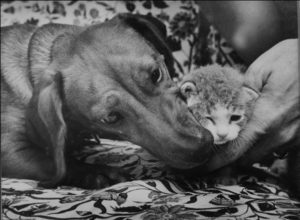 So George walked over in his cranky way to see what was going on with the mewing kitten and something very surprising happened. George jumped in bed with Tucker and became Tucker’s mom – cleaned Tucker and warmed Tucker and stayed by Tucker’s side 24 hours a day for two weeks until Tucker was healed and well. And my Uncle Joseph Kugielsky was a photographer for the New York Times and some local papers in Connecticut. And he took this picture..and you are right to “ahhhh” because it’s adorable. He ran this picture in some local papers, so for a day Tucker and George were really famous in animal circles in south-western Connecticut.
So George walked over in his cranky way to see what was going on with the mewing kitten and something very surprising happened. George jumped in bed with Tucker and became Tucker’s mom – cleaned Tucker and warmed Tucker and stayed by Tucker’s side 24 hours a day for two weeks until Tucker was healed and well. And my Uncle Joseph Kugielsky was a photographer for the New York Times and some local papers in Connecticut. And he took this picture..and you are right to “ahhhh” because it’s adorable. He ran this picture in some local papers, so for a day Tucker and George were really famous in animal circles in south-western Connecticut.